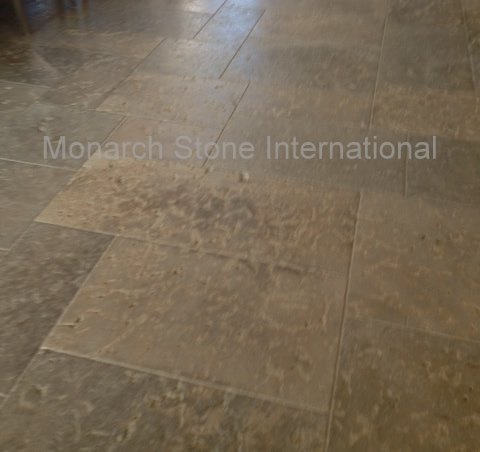Natural Stone Sealants Discussed
We often are asked about natural stone sealants. How do they work, are they necessary and which is best to use for the natural stone veneer, architectural stone elements, stone flooring, driveway stone, walkway stone or other hardscape areas we supply?
Monarch Stone International imports antique reclaimed cobblestone and curb from Europe; Historic European Cobblestone. This antique reclaimed stone does not require a sealer, as it is already weathered, worn and hundreds of years old! This natural aged antique patina is what makes genuine cobblestone and curb so charming and beautiful.
For the other types of natural stone our company supplies, we recommend our customers speak to their installer or a sealant professional for more information about sealing their natural stone. According to the editors at Stone World Magazine, they feel all stone and tile products –even porcelain tile –benefits from sealing. However, according to MIA/BSI, in some cases it makes sense to seal the stone, in others not. Once properly sealed, the stone will be protected against everyday dirt and spills. In other cases, it is best to leave the stone untreated. Topical sealers can alter the surface texture and finish as well as build up on the surface, creating a layer that is less durable than the stone. Generally, topical sealers are not recommended in exterior applications because they can trap moisture within the top layer of the stone, which may lead to surface deterioration during freeze/thaw cycles.
The Marble Institute of America (MIA) recognizes the benefits that sealers can provide in certain applications. MIA recommends that care be exercised in the application of any chemical to a stone’s surface. Although normally innocent in and of themselves, some sealers have reportedly reacted with some cleaning/maintenance chemicals and/or with components within the stone surface, causing some reactions.Many products on the market have been designed to beautify and “protect” the surfaces of stone,
The following is a somewhat detailed summary of the many products on the market have been designed to beautify and “protect” the surfaces of stone, tile and grout:
Sealers
Finishes
Waxes
Color Enhancers
Impregnators
Sealers: sealers actually seal the surface tight against chemicals, water and other contaminants. Normally, a finish is placed on top of a sealer. Sealers typically are not vapor permeable and can be semi-permanent and hard to repair. Sealers can be water-based or solvent-based. Most water-based sealers cannot be used outside.
Finishes: Finishes are coatings that incorporate acrylic polymers, synthetic polymerized waxes and natural waxes. These products form a hard, transparent film and are typically applied to a surface after it has been sealed.
Waxes: Waxes are normally comprised of naturally occurring elements such as carnuba and beeswax. Waxes are soft materials and require buffing to obtain gloss. However waxes have low durability and may require multiple applications. Most are vapor permeable and can be easily applied and repaired when scratched or damaged.
Color enhancers: These products are topical coatings in the truest sense of the word. Typically, these products are acrylics and modified acrylics with lower solids and lower viscosity. They tend to penetrate more deeply than a traditional topical coating. Color enhancers can also be more durable, allow vapor transmission and many can be used outside in the elements. As with most products, color enhancers are available in both solvent-based and water-based formulas.
Impregnators and Penetrating Sealers are products that are surface treatments that will not change the natural look of the substrate. Impregnators will not show scratching or scuffing and do not require constant attention to maintain the quality of finish. Re-application of an impregnator can range from six months to 20 years, depending on the manufacturer, substrate and surface location. An impregnator will resist water, oils, grease, mold, mildew, algae, efflorescence, graffiti, grout dyes, epoxy grout film, cement grout film, mortar haze, acid rain, atmospheric dirt, lime deposits, soap scum and other penetrating items. In addition, many impregnators make the surface less slippery, harder, and allow 100% vapor transmission.
The only way to protect the substrate is to penetrate it with something that will carry the protection into it. One of two carriers are typically used: solvent or water. Usually, solvents will allow varied and deeper penetration into the substrate than water. Water-based products are typically lower in toxicity and have little or no smell as compared to similar solvent-based products.
With water-based impregnators, the water evaporates and leaves behind a film. This makes it more difficult to penetrate the solid. The impregnator makes it more difficult for most liquids to penetrate which then creates the “beading” action that customers are so fond of. With solvent-based impregnators, there is an added benefit of a cross-link phenomenon that creates a “barrier.” This added barrier virtually eliminates any penetration of liquids and so for these reasons, products that best protect stone and tile against water and oil stains contain complex and unique polymers and co-polymers.
We recommend speaking to your installation company and a stone sealant professional to ensure which product will be appropriate and perform as promised, Request independent backup for all claims made by any company. It is very simple for manufacturers to supply their products to independent labs for testing. If the results favor the specific needs of an application, then test the products yourself on a sample piece of stone if possible.

